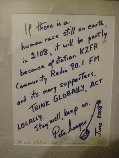In 1958 or ’59 Pete Seeger’s publisher complained that he was writing too many topical and protest songs and needed a song with more commercial potential, another “Good Night Irene.” Angrily Seeger looked through his notebook and found some verses from an ancient book that he had copied down a year or so before: “I added one line, omitted a few lines, and repeated the first two lines as a chorus, plus one new word repeated three times. Taped it. Mailed it the next morning. Got a letter from the publisher two days later, ‘Wonderful; just what I hoped for…’”
"Turn! Turn! Turn! (To Everything There Is a Season)" was adapted by Seeger from the Book of Ecclesiastes, a document of wisdom literature from the Hebrew Old Testament. Wisdom literature was a genre of writing found in many cultures throughout the Ancient Near East. It is characterized by sayings that illustrate and teach about virtue, and offers insights into each culture’s perspective of nature and reality. The Book of Ecclesiastes’ primary protagonist is Qoheleth, a character whose purpose is to find out how to live the best possible life in a perplexing world that ends only in death.
Tradition holds that the Book of Ecclesiastes was written by the mythic King Solomon. Solomon was supposed to have reigned from 970 to 931 BC but most Hebrew historians and linguists think that the document had its origins much later than the biblical chronology suggests. Its grammar and syntax are of the Late Hebrew linguistic style and the presence of Aramaic and Persian words date it to the 3rd or early 4th century BC at the very earliest. Key concepts within the book also suggest the influence of Hellenistic Greek philosophies that also date from that later time period.
The first eight verses of the third chapter of Ecclesiastes are the source of Seeger’s inspiration:
“To every thing there is a season, and a time to every purpose under the heaven: A time to be born, and a time to die; a time to plant, and a time to pluck up that which is planted; a time to kill, and a time to heal; a time to break down, and a time to build up; a time to weep, and a time to laugh; a time to mourn, and a time to dance; a time to cast away stones, and a time to gather stones together; a time to embrace, and a time to refrain from embracing; a time to get, and a time to lose; a time to keep, and a time to cast away; a time to rend, and a time to sew; a time to keep silence, and a time to speak; a time to love, and a time to hate; a time for war, and a time for peace.”
Seeger’s sole lyrical contribution (besides the title) is an addition to the closing line: “….a time for peace, I swear it’s not too late.”
Seeger began performing “Turn, Turn, Turn” in 1959 but didn’t record it until 1962. It was actually first recorded by The Limeliters on their 1962 album "Folk Matinee" which was released a few months before Seeger’s 1962 live record “The Bitter & the Sweet.” One of the Limeliters’ guitar-banjo accompanists was Jim McGuinn who was also a big fan of Seeger’s and knew his repertoire. A year later McGuinn was providing musical arrangements for Judy Collins. He arranged a more rhythmical ‘chamber-folk’ style, 4/4 version of the song for Collins' 1963 album "Judy Collins 3".
By 1965 McGuinn had formed a rock band that played folk tunes. The Byrds had already had one Top Forty #1 song with their version of Bob Dylan’s “Mr. Tambourine Man.” McGuinn says that one day his girlfriend had requested “Turn, Turn, Turn” on their tour bus between shows. When McGuinn played it for her, “it came out rock ‘n roll because that’s what I was programmed to do…..I couldn’t do it as it was traditionally. It came out with that samba beat….” He thought the lyrics and added rhythm gave it potential and the band released it as a single and the title track of their next album, and both reached the Top 10 on the pop charts in October 1965, and solidified folk rock as a popular musical trend.
The America of October 1965 was fractured by civil rights issues and by the escalation of the Vietnam War. “Turn, Turn, Turn” had evolved in much the same way all folk music does (it was adapted and adopted), and it did what any good folk song would do: It spoke to people who were unsettled by their social and political climate. It addressed issues of immediate concern. It provoked thought and cried out for solutions.
Seeger’s response to the hit song was: “I was delighted with what they did…even though they changed the melody [and left off the last verse]. When I sing it now, I have to laugh, because half the audience is singing their melody and half is singing mine, and they clash.” Later he sometimes even gave up and sang the Byrds melody.
Seeger welcomed the royalties as well. But because he only wrote the music and six words and can’t share the income with King Solomon (is it ironic that a king can’t share in royalties?), Seeger provides 45% of the song’s riches to the Israeli Committee Against House Demolitions (icahdusa.org).
ICAHD was founded as "an Israeli peace and human rights organization dedicated to ending the occupation of the Palestinian territories and achieving a just peace between Israelis and Palestinians." In particular ICAHD uses non-violent, direct-action means of resistance to end Israel's policy of demolishing Palestinian homes in the occupied territories. ICAHD's activities include exhibits, films, workshops, tours of the occupied territories, publication of books and articles on the Israeli occupation of the West Bank, East Jerusalem and Gaza, international advocacy.
ICAHD also organizes the rebuilding of demolished Palestinian houses using a network of Israeli, Palestinian and international volunteers. As of April 2012 the organization has rebuilt approximately 1,000 homes including 200 in East Jerusalem. In addition to rebuilding demolished Palestinian houses, ICAHD often takes legal actions on behalf of Palestinians whose houses have been demolished or are threatened with demolition.
But "Turn, Turn, Turn" transcends politics, and in the 1970's Pete's wife Toshi (1922-2013) wrote her own words to the song. Because her life at that time was less focused on political and social activism and more on family and children, her lyrics reflect the wonder of childhood and the hope of parents. Here's a link to Dan Zanes & Elizabeth Mitchell performing Toshi Seeger's version:
http://www.youtube.com/watch?v=RkUldreCyZU
Pete and Toshi, like Qoheleth, sought how to live the best possible life in a perplexing
world. They both succeeded.
Sources: “Turn, Turn, Turn - The 60’s Folk Rock Revolution” by Ritchie Unterberger (2002); “Where Have All The Flowers Gone” a songbook by Pete Seeger (1993), and www.icahdusa.org.
"If there is a human race still on earth in 2108, it will be partly because of station KZFR Community Radio 90.1 FM and its many supporters. THINK GLOBALLY, ACT LOCALLY. Stay well, keep on." -- Pete Seeger, June 2008













